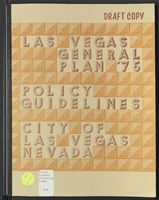Search the Special Collections and Archives Portal
Search Results
Elizabeth McKillip oral history interview
Identifier
Abstract
Oral history interview with Elizabeth McKillip conducted by Dan Cassese on May 09, 1986 for the Ralph Roske Oral History Project on Early Las Vegas. In this interview, McKillip discusses changes in Las Vegas, Nevada. She specifically discusses growth, pollution, and the environment in Las Vegas.
Archival Collection

Transcript of interview with Victor Givens by LeGary Stowers, March 15, 1981
Date
Archival Collection
Description
On March 15, 1981, LeGary Stowers interviewed Victor Givens (born 1958 in Las Vegas, Nevada) about his profession in the gaming industry, specifically as a table games dealer. Givens first talks about his family background and then talks about his educational, occupational, and residential histories. He then talks about the various qualities required of individuals who work in the casino industry, his beliefs regarding religion and gambling, and some of the motivations and goals that are present for those within the field of gaming.
Text
Floyd Lamb oral history interview
Identifier
Abstract
Oral history interview with Nevada State Senator Floyd Lamb conducted by Linda Nelson on February 01, 1972 for the Ralph Roske Oral History Project on Early Las Vegas. Lamb discusses Southern Nevada history, economy, environment, and social changes.
Archival Collection
David Bruce Dill oral history interview
Identifier
Abstract
Oral history interview with David Bruce Dill conducted by R. C. Turner on May 04, 1976 and May 12, 1976 for the Ralph Roske Oral History Project on Early Las Vegas. Dill discusses the desert environment, human adaptation to the weather, and the Boulder Dam Bureau of Mines.
Archival Collection

Las Vegas General Plan '75: policy guidelines
Date
Description
City of Las Vegas, Nevada general plan, draft copy.
From the introduction: "This is a document of policies. These policies are in the form of recommendations to the City of Las Vegas for planning policies in the areas of: Population and Economic Development, Land Use, Housing, Community Facilities, Conservation, Transportation, Parks and Recreation, Visual Environment, Implementation."
Text
Audio recording clip of interview with Bruce Church by Jeffrey Richardson, April 27, 2004
Date
Archival Collection
Description
Sound

Transcript of interview with Dr. Jacob Paz by Claytee White, September 15, 2014
Date
Archival Collection
Description
During the 1950s, Dr. Jacob Paz grew up in an agricultural environment in Israel where he attended a very famous high school in Israel called Kadoorie where Yitzhak Rabin was a student. After his graduation, Jacob joined the Israeli army building his skills so that he could get into technical school after he fulfilled his army service. For two years he attended technical school and then started working for the Israel Atomic Energy Commission in Dimona, Israel making atomic bombs in the 1960’s. After working in Dimona, Jacob was accepted into UC Davis and moved to the United States to study veterinary medicine. After one semester, he realized that he preferred history and left California for New York City, There he earned degrees in Jewish history and chemistry from the Jewish Theological Seminary. He quickly moved onto graduate school and earned his master’s degree in marine science and environment from CW Post, Long Island University in Greenvale, New York. In 1972, he returned to I
Text
U.S. Government Records, 1944-2014
Level of Description
Scope and Contents
The government records series, from 1944 to 2004, include atomic testing schedules, detonation reports and ship's log books for Bikini Islands and Marshall Islands and detailed material on the Nevada Test Site (NTS) operations. The NTS information includes underground nuclear test census information from Reynolds Electric and Engineering Company (REECo), the main government contractor for the site. The NTS and general reports are comprised of fallout reactions to the environment and in ground personnel, contamination estimates, analysis of information, and legislative actions.
Archival Collection
Collection Name: Alice P. Broudy Papers on Broudy v. United States
Box/Folder: N/A
Archival Component


